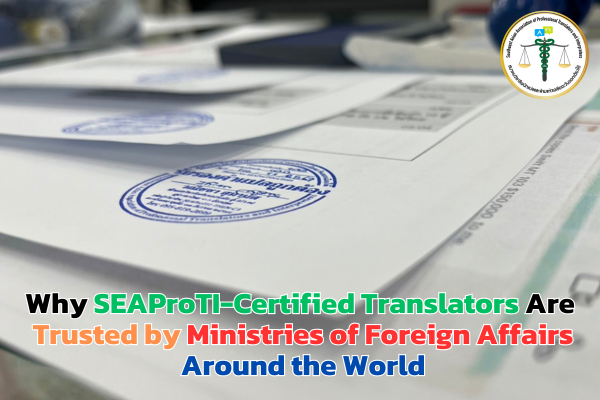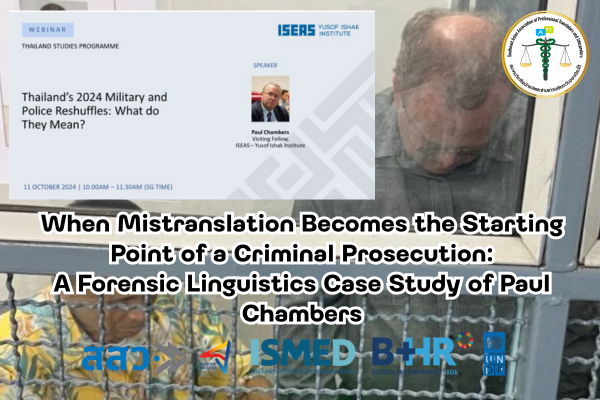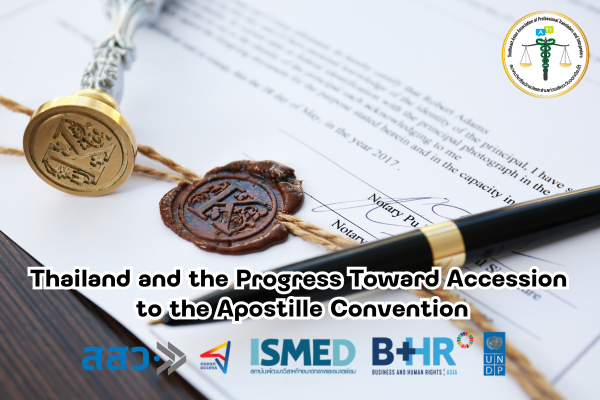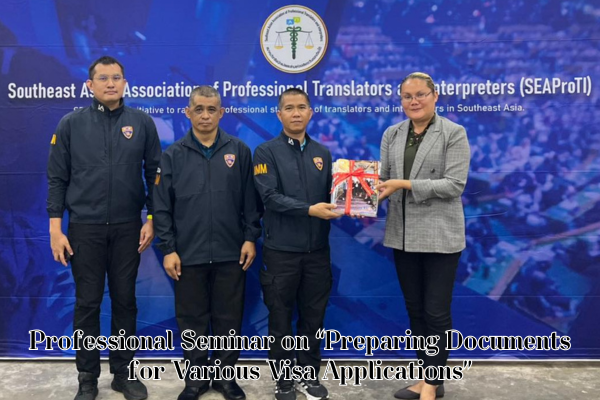The Role of Interpreters in the Justice System
and the Impact of Misinterpretation Under Criminal Code Section 178
18 February 2025
The Importance of Interpreters in the Justice System
Interpreters play a crucial role in the justice system, serving as a bridge between different languages to ensure that all parties involved fully understand the information, charges, and their rights. The presence of interpreters allows individuals who do not speak Thai, such as foreigners or those with language limitations, to access justice fairly.
-
Accurate Communication
-
Interpreters must translate content precisely to ensure that defendants understand the charges and the legal proceedings correctly.
-
-
Rights Protection
-
In Thailand, the law mandates the presence of interpreters to safeguard the rights of defendants, in accordance with human rights principles.
-
Criminal Code Section 178 and Penalties for Misinterpretation
According to Criminal Code Section 178, any judicial officer, prosecutor, case officer, or investigator who assigns an interpreter to translate any statement or meaning and the interpreter provides a significantly incorrect translation may face imprisonment of up to three years, a fine not exceeding sixty thousand baht, or both.
Consequences of Misinterpretation
Misinterpretation by an interpreter can lead to serious legal complications and negative consequences for individuals in the justice process, such as:
-
Misunderstanding
-
If an interpreter uses incorrect or misleading terms, the defendant may misunderstand the charges, potentially affecting their legal decisions.
-
-
Unfair Judicial Process
-
A mistranslation can lead to unintended guilty pleas or incorrect testimonies, impacting the fairness of court proceedings and rulings.
-
Standards and Qualifications for Judicial Interpreters
To prevent misinterpretation issues, certain standards for judicial interpreters must be in place, including:
-
Interpreter Qualifications
-
Interpreters must have excellent language skills and a solid understanding of legal terminology.
-
-
Training and Certification
-
Interpreters should undergo professional training in legal interpretation and obtain certification from relevant authorities.
-
Guidelines for Interpreters in Cases of Misinterpretation
If an interpreter realizes they have made a mistake in translation during judicial proceedings, they should take the following actions:
-
Correct the Mistake Immediately
-
If a mistake is noticed, the interpreter should promptly inform the court or relevant officials and request to correct it during the proceedings. Post-trial corrections can be challenging, especially in criminal cases that impact a defendant’s life and freedom.
-
-
Prevent Incorrect Statements from Affecting the Verdict
-
If a misinterpretation is left uncorrected, it may affect the case’s outcome and cause significant harm to those involved. The interpreter should ensure the correction is made before the verdict is issued.
-
Guidelines for Those Affected by Misinterpretation
If an individual is affected by an interpreter’s misinterpretation and can prove that it has influenced the case, they should take the following steps:
-
Report the Issue to the Court or Relevant Authorities Immediately
-
If a misinterpretation is discovered that impacts the case, a request for review and correction should be submitted.
-
-
Take Legal Action Against the Interpreter if Negligence or Malintent is Proven
-
If the misinterpretation results from deliberate misconduct or serious negligence, the affected party may appoint a lawyer to pursue legal action against the interpreter according to relevant laws.
-
Conclusion
Interpreters in the justice system play a vital role in ensuring fairness in legal proceedings. Accurate interpretation is fundamental to a fair trial, as misinterpretations can lead to misunderstandings, affect the rights of defendants, and compromise the integrity of legal rulings. Therefore, rigorous interpreter training and the establishment of strict professional standards are necessary to ensure that justice is upheld for all parties involved.
SEAProTI’s certified translators, translation certification providers, and certified interpreters:
The Southeast Asian Association of Professional Translators and Interpreters (SEAProTI) has officially announced the criteria and qualifications for individuals to register as “Certified Translators,” “Translation Certification Providers,” and “Certified Interpreters” under the association’s regulations. These guidelines are detailed in Sections 9 and 10 of the Royal Thai Government Gazette, issued by the Secretariat of the Cabinet under the Office of the Prime Minister of the Kingdom of Thailand, dated July 25, 2024, Volume 141, Part 66 Ng, Page 100.
To read the full publication, visit: the Royal Thai Government Gazette
บทบาทของล่ามในกระบวนการยุติธรรมและผลกระทบจากการแปลผิด ตามประมวลกฎหมายอาญา มาตรา 178
18 กุมภาพันธ์ 2568
ความสำคัญของล่ามในกระบวนการยุติธรรม
ล่ามมีบทบาทสำคัญอย่างยิ่งในกระบวนการยุติธรรม โดยทำหน้าที่เป็นสะพานเชื่อมระหว่างภาษาต่างๆ เพื่อให้ทุกฝ่ายที่เกี่ยวข้องสามารถเข้าใจข้อมูล ข้อกล่าวหา และสิทธิของตนได้อย่างถูกต้อง การมีล่ามช่วยให้บุคคลที่ไม่สามารถสื่อสารภาษาไทยได้ เช่น ชาวต่างชาติ หรือบุคคลที่มีข้อจำกัดทางภาษา สามารถเข้าถึงกระบวนการยุติธรรมได้อย่างเป็นธรรม
-
การสื่อสารที่ถูกต้อง
ล่ามต้องแปลเนื้อหาอย่างแม่นยำ เพื่อให้แน่ใจว่าผู้ต้องหาหรือจำเลยเข้าใจข้อกล่าวหาและกระบวนการพิจารณาคดีอย่างถูกต้อง -
การปกป้องสิทธิ
ในประเทศไทย กฎหมายกำหนดให้มีล่ามช่วยเหลือผู้ต้องหาเพื่อให้ได้รับการพิจารณาคดีอย่างเป็นธรรม ตามหลักสิทธิมนุษยชน
ประมวลกฎหมายอาญา มาตรา 178 และโทษสำหรับล่ามที่แปลผิด
ตาม ประมวลกฎหมายอาญา มาตรา 178 กำหนดให้เจ้าพนักงานตุลาการ พนักงานอัยการ ผู้ว่าคดี หรือพนักงานสอบสวน ที่ให้ล่ามแปลข้อความหรือความหมายใด หากล่ามแปลผิดไปในข้อสำคัญ อาจต้องรับโทษจำคุกไม่เกินสามปี หรือปรับไม่เกินหกหมื่นบาท หรือทั้งจำทั้งปรับ
ผลกระทบจากการแปลผิด
หากล่ามแปลผิด อาจก่อให้เกิดปัญหาทางกฎหมายและผลกระทบที่ร้ายแรงต่อผู้ที่อยู่ในกระบวนการยุติธรรม เช่น:
-
ความเข้าใจผิด
-
หากล่ามใช้คำที่ผิดพลาดหรือคลาดเคลื่อน อาจทำให้ผู้ต้องหาเข้าใจข้อกล่าวหาไม่ถูกต้อง ซึ่งอาจส่งผลต่อการตัดสินใจในการต่อสู้คดี
-
-
ความไม่เป็นธรรมในกระบวนการยุติธรรม
-
การแปลผิดอาจนำไปสู่การสารภาพผิดโดยไม่ได้ตั้งใจ หรือทำให้คำให้การผิดเพี้ยน ส่งผลต่อแนวทางการพิจารณาคดีและความเป็นธรรมของคำตัดสิน
-
มาตรฐานและคุณสมบัติของล่ามในกระบวนการยุติธรรม
เพื่อป้องกันปัญหาการแปลผิด จำเป็นต้องมีมาตรฐานสำหรับล่ามในกระบวนการยุติธรรม ได้แก่:
-
คุณสมบัติของล่าม
-
ล่ามต้องมีทักษะด้านภาษาอย่างดีเยี่ยม และเข้าใจคำศัพท์ทางกฎหมาย
-
-
การฝึกอบรมและการรับรอง
-
ล่ามควรได้รับการฝึกอบรมเกี่ยวกับการแปลในกระบวนการยุติธรรม และควรผ่านการรับรองจากหน่วยงานที่เกี่ยวข้อง
-
แนวทางสำหรับล่ามในกรณีแปลผิด
หากล่ามพบว่าตนเองแปลผิดในกระบวนการยุติธรรม ควรดำเนินการดังนี้:
-
รีบแก้ไขทันที
-
เมื่อพบว่ามีการแปลผิด ควรแจ้งต่อศาลหรือเจ้าหน้าที่ที่เกี่ยวข้องโดยเร็วที่สุด พร้อมขอแก้ไขในระหว่างการพิจารณาคดี ห้ามรอจนกระบวนการเสร็จสิ้น เพราะอาจทำให้การแก้ไขเป็นไปได้ยาก โดยเฉพาะในคดีอาญาที่มีผลกระทบต่อชีวิตและเสรีภาพของผู้ต้องหา
-
-
อย่าปล่อยให้ข้อความผิดส่งผลต่อคำพิพากษา
-
หากล่ามปล่อยให้ความผิดพลาดส่งผลต่อกระบวนการตัดสินคดี อาจทำให้ผู้ที่เกี่ยวข้องเสียหายอย่างร้ายแรง ควรรีบแจ้งและแก้ไขก่อนที่คำพิพากษาจะออกมา
-
แนวทางสำหรับผู้ได้รับผลกระทบจากการแปลผิด
หากบุคคลใดได้รับผลกระทบจากการแปลผิดของล่าม และสามารถพิสูจน์ได้ว่าการแปลผิดส่งผลต่อคดี ควรดำเนินการดังนี้:
-
แจ้งต่อศาลหรือหน่วยงานที่เกี่ยวข้องทันที
-
หากพบว่ามีการแปลผิดและส่งผลต่อคดี ควรร้องขอให้มีการตรวจสอบและแก้ไข
-
-
ดำเนินคดีกับล่ามหากพบว่าการแปลผิดเกิดจากความประมาทหรือเจตนาไม่สุจริต
-
ในกรณีที่การแปลผิดเกิดจากความจงใจหรือความประมาทที่ร้ายแรง ผู้เสียหายสามารถตั้งทนายและดำเนินการทางกฎหมายต่อผู้แปลได้ตามกฎหมายที่เกี่ยวข้อง
-
บทสรุป
ล่ามในกระบวนการยุติธรรมมีบทบาทสำคัญอย่างยิ่งต่อการรักษาความเป็นธรรมในระบบกฎหมาย การแปลที่แม่นยำเป็นหัวใจของการพิจารณาคดีที่ยุติธรรม หากมีการแปลผิด อาจก่อให้เกิดความเข้าใจผิด ส่งผลกระทบต่อสิทธิของผู้ต้องหา และสร้างความไม่เป็นธรรมในกระบวนการพิจารณาคดี ดังนั้น การฝึกอบรมล่ามและการกำหนดมาตรฐานที่เข้มงวดจึงเป็นสิ่งจำเป็น เพื่อให้แน่ใจว่ากระบวนการยุติธรรมสามารถดำเนินไปอย่างถูกต้องและเป็นธรรมต่อทุกฝ่ายที่เกี่ยวข้อง
เกี่ยวกับนักแปลรับรอง ผู้รับรองการแปล และล่ามรับรองของสมาคมวิชาชีพนักแปลและล่ามแห่งเอเชียตะวันออกเฉียงใต้
สมาคมวิชาชีพนักแปลและล่ามแห่งเอเชียตะวันออกเฉียงใต้ (SEAProTI) ได้ประกาศหลักเกณฑ์และคุณสมบัติผู้ที่ขึ้นทะเบียนเป็น “นักแปลรับรอง (Certified Translators) และผู้รับรองการแปล (Translation Certification Providers) และล่ามรับรอง (Certified Interpreters)” ของสมาคม หมวดที่ 9 และหมวดที่ 10 ในราชกิจจานุเบกษา ของสำนักเลขาธิการคณะรัฐมนตรี ในสำนักนายกรัฐมนตรี แห่งราชอาณาจักรไทย ลงวันที่ 25 ก.ค. 2567 เล่มที่ 141 ตอนที่ 66 ง หน้า 100 อ่านฉบับเต็มได้ที่: นักแปลรับรอง ผู้รับรองการแปล และล่ามรับรอง
























